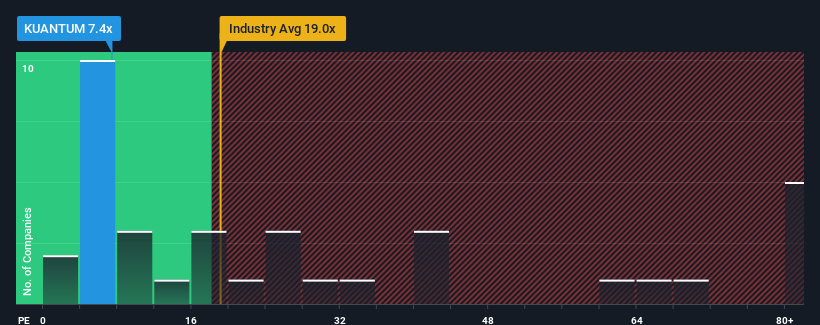- India
- /
- Paper and Forestry Products
- /
- NSEI:KUANTUM
The Market Doesn't Like What It Sees From Kuantum Papers Limited's (NSE:KUANTUM) Earnings Yet
When close to half the companies in India have price-to-earnings ratios (or "P/E's") above 32x, you may consider Kuantum Papers Limited (NSE:KUANTUM) as a highly attractive investment with its 7.4x P/E ratio. However, the P/E might be quite low for a reason and it requires further investigation to determine if it's justified.
Recent times have been quite advantageous for Kuantum Papers as its earnings have been rising very briskly. One possibility is that the P/E is low because investors think this strong earnings growth might actually underperform the broader market in the near future. If you like the company, you'd be hoping this isn't the case so that you could potentially pick up some stock while it's out of favour.
Check out our latest analysis for Kuantum Papers

What Are Growth Metrics Telling Us About The Low P/E?
In order to justify its P/E ratio, Kuantum Papers would need to produce anemic growth that's substantially trailing the market.
Taking a look back first, we see that the company grew earnings per share by an impressive 184% last year. Still, EPS has barely risen at all from three years ago in total, which is not ideal. So it appears to us that the company has had a mixed result in terms of growing earnings over that time.
Comparing that to the market, which is predicted to deliver 24% growth in the next 12 months, the company's momentum is weaker based on recent medium-term annualised earnings results.
With this information, we can see why Kuantum Papers is trading at a P/E lower than the market. Apparently many shareholders weren't comfortable holding on to something they believe will continue to trail the bourse.
The Bottom Line On Kuantum Papers' P/E
We'd say the price-to-earnings ratio's power isn't primarily as a valuation instrument but rather to gauge current investor sentiment and future expectations.
We've established that Kuantum Papers maintains its low P/E on the weakness of its recent three-year growth being lower than the wider market forecast, as expected. At this stage investors feel the potential for an improvement in earnings isn't great enough to justify a higher P/E ratio. Unless the recent medium-term conditions improve, they will continue to form a barrier for the share price around these levels.
There are also other vital risk factors to consider before investing and we've discovered 2 warning signs for Kuantum Papers that you should be aware of.
If these risks are making you reconsider your opinion on Kuantum Papers, explore our interactive list of high quality stocks to get an idea of what else is out there.
Valuation is complex, but we're here to simplify it.
Discover if Kuantum Papers might be undervalued or overvalued with our detailed analysis, featuring fair value estimates, potential risks, dividends, insider trades, and its financial condition.
Access Free AnalysisHave feedback on this article? Concerned about the content? Get in touch with us directly. Alternatively, email editorial-team (at) simplywallst.com.
This article by Simply Wall St is general in nature. We provide commentary based on historical data and analyst forecasts only using an unbiased methodology and our articles are not intended to be financial advice. It does not constitute a recommendation to buy or sell any stock, and does not take account of your objectives, or your financial situation. We aim to bring you long-term focused analysis driven by fundamental data. Note that our analysis may not factor in the latest price-sensitive company announcements or qualitative material. Simply Wall St has no position in any stocks mentioned.
About NSEI:KUANTUM
Kuantum Papers
Produces, markets, and sells agro and wood-based paper products in India.
Average dividend payer with mediocre balance sheet.
Market Insights
Community Narratives




